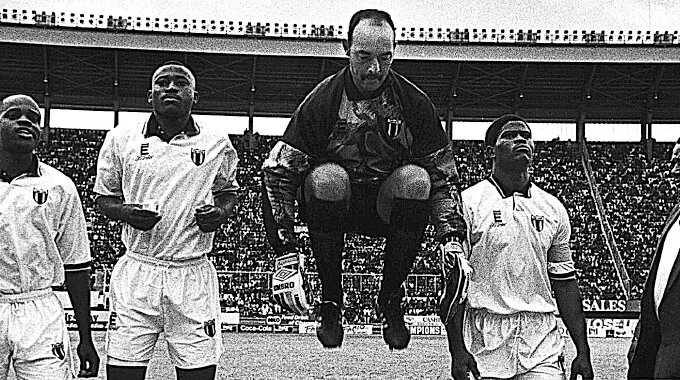Robson Sharuko Senior Sports Editor
THE National Sports Stadium and the FNB Stadium opened their gates just two years apart but, while one giant has evolved into a world-class facility which hosted the World Cup final, the other has suffered from years of neglect and is now even barred from staging an AFCON qualifier.
Zimbabwe’s biggest stadium, which was built with the assistance of the Chinese Government, opened its gates in 1987 before it was closed in November 2006 to make way for major renovations, which were completed in March 2010.
South Africa’s biggest stadium, which cost an initial US$440m to build in three years, opened its gates in 1989 and underwent major refurbishment in 2006 ahead of the FIFA World Cup finals, at a cost of a further US$211 million, and renamed Soccer City for the global football showcase.
FIFA do not allow stadiums to be referred to by names of sponsors, or corporate partners, during the World Cup finals.
However, it has since reverted to its original name, which it got after First National Bank, one of South Africa’s Big Five Banks, a division of First Rand Ltd, which is a large financial services conglomerate, secured naming rights for the stadium, just before it first opened its gates in 1989.
Advertisement
FNB also poured US$30 million into the 2010 World Cup as a FIFA partner.
The FNB Stadium remains the property of the South African government, which passed its ownership into the hands of the City of Johannesburg on a 99-year lease, while its management is under the portfolio of Stadium Management SA.
SMSA manage “four flagship stadiums in the Metropolitan of Johannesburg, namely the iconic FNB, historic Orlando, Dobsonville and Rand,’’ the company says.
‘‘These government-owned venues are privately and independently administered by SMSA on a full financial risk basis with the significance of this being that, SMSA does not receive any management fee, subsidy or grant.
‘‘This means that SMSA independently funds the commercial business of these multi-purpose, adaptable venues capable of hosting world class events in the sports and entertainment industries, as well as conferences and political rallies.
‘‘Management of these multi-million rand venues entails services in various industries including finance and commerce (sponsorship, advertising, retail, stakeholder return and investment, commercial rights management, home teams).
‘‘Operations and facilities management (support services, catering, hospitality, maintenance, pitch management, cleaning, waste management, security, health and safety) and event planning (security and disaster management, local authority collaboration, transport and parking, technical and event management, emergency and police services).
‘‘SMSA is dedicated to stimulating enterprise opportunities for the local community and prides itself on a proven track record of integrity, trust, innovation, collaboration and superior service delivery.
‘‘SMSA is committed to providing opportunities and making a positive impact on the lives of its surrounding communities. The Stadium Management Trust was formed to provide such opportunities to the underprivileged and previously disadvantaged members in its communities.
‘‘This has been and is continuously done through various projects which include providing job opportunities, feeding schemes, stadium tours, complimentary tickets and internships.’’
Advertisement
The National Sports Stadium is run by the Ministry of Local Government, Public Works and National Housing.
And, as Zimbabwe battles with the decision by the Confederation of African Football to ban all the country’s stadiums from hosting international matches, the issue of how these facilities can be maintained, without piling the costs on both the central and local governments, has again been thrown into the spotlight.
Former Premier Soccer League fixtures secretary, Beadle Musa Gwasira, believes the country should adopt a similar model to the South Africans by tapping into the lucrative business of giving stadiums to commercial partners, for naming rights, with both the central and local government deriving a value from the partnerships.
Gwasira believes the management of the country’s major stadiums, like the ones in the Gauteng area of Johannesburg, should also be invested in the hands of independent contractors who can come up with ways of extracting value from their management of the facilities.
The Harare businessman, who once owned a domestic Premiership football club, Lengthens, which won the BancABC Cup and represented the country in the CAF Confederation Cup, should be an authoritative voice on the subject given he was also a Harare City councillor for Ward 7 which incorporates Avondale, Strathaven, Belgravia, Alex Park and Gunhill.
He was also part of the PSL board of directors, led by Twine Phiri, which inherited a league which did not have a sponsor in 2010 but found a way to bring on board Delta Beverages, through their Castle brand, as the flagship sponsor of the top-flight league while also luring Mbada Diamonds on board.
That PSL leadership partnered the domestic top-flight league with SuperSport for the live coverage of local matches on their platforms.
‘‘I have been following the issue of the stadiums very closely and it’s unfortunate that it has come to this with us being barred from hosting our international matches at home which is a huge setback for our national teams because there are some advantages that come with playing at home,’’ said Gwasira.
‘‘I think, one of the solutions to all this is to adopt what others are doing elsewhere and there is a reason why the City of Johannesburg, which is one of the richest metropolitan areas in Africa, finds it reasonable to get a naming rights partner, in this case FNB, for the biggest stadium in South Africa.
‘‘They also handed the management of the stadium, and other stadiums in that area, to an independent management company whose job is to ensure that it balances the costs of maintaining the stadium and also getting a profit for all the partners who have a stake in that stadium.
Advertisement
‘‘Once you do that, you free the local government from having to worry about the costs of maintaining the stadium, which are huge, and the commercial partner, whose name is carried by the stadium, also pours in a significant chunk into the project which then produces a win-win situation.
‘‘We have such companies in this country and I don’t know why we have never wanted to take that route even when wealthy clubs like Arsenal have to find a partner who gets the rights for the name of their stadium while we just hold on to Rufaro, Gwanzura, even when it’s no longer viable to do that.
‘‘Our councils simply don’t have the money to provide the basic things like clean water, maintenance of the roads and refuse collection and I think it becomes quit difficult to expect them to then pour a lot of money that is needed in maintaining the stadiums and that is when you need independent companies, to manage such facilities, and corporate partners to come on board.’’
Gwasira said a look at the sports clubs in Harare, which have corporate partners, and those without, even though they are all leasing the facilities from the council, drives home the message.
‘‘Old Hararians Sports Club have a corporate partner and just going there you will see the difference with the other sports clubs without such a partnership, the same is also true about Belgravia Sports Club, which is now a beautiful club,’’ said Gwasira.
‘‘The same is also true when you look at the different swimming pools in Harare, those who are backed by corporate partners and those that are under the direct supervision of the City of Harare.
‘‘So, why can’t we have Econet or CBZ Bank coming on board to take the naming rights for Rufaro or Gwanzura, it’s business, and that is what sport has become today.’’
– HERALD








